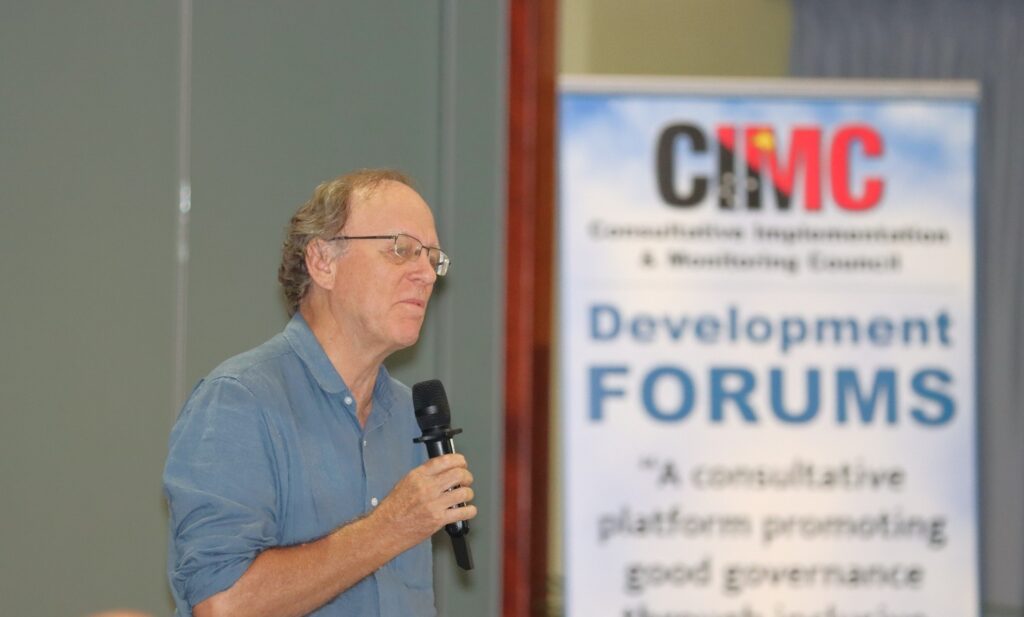Lae, Tuesday, 8 April 2025 – The Executive Director of the Institute of National Affairs (INA), Paul Barker, has called for well-targeted and balanced regulation of Papua New Guinea’s oil palm industry, cautioning against efforts that could undermine the sector’s progress or penalise responsible operators.
Speaking at the National Agriculture Industry Public-Private Sector Partnership Conference in Lae, Mr Barker provided historical context for the growth of the oil palm industry in PNG and addressed recent claims that the sector developed without a clear policy framework.
“That suggestion is simply incorrect,” Mr Barker stated. “From the outset, the government was actively involved—not only in policy design, but also in direct participation through shareholding arrangements and collaboration with development partners.”
He pointed out that the state initially held a 50% shareholding in major oil palm projects and worked with international institutions such as the World Bank and Asian Development Bank to fund settlement and outgrower schemes.
Mr Barker also highlighted the role of former Prime Minister Sir Julius Chan, who helped bring in international investment partners such as SIPEF, a Belgian agribusiness company that invested in the Hargy Oil Palms project in West New Britain Province.
A Structured System
He described the early development of the sector as carefully structured, with government efforts aimed at laying a foundation for private sector and smallholder involvement. This included facilitating access to land, providing credit through development banks, and designing a pricing formula that ensured fair returns for smallholders.
However, Mr Barker noted that falling global prices in the late 1980s exposed weaknesses in the pricing model and prompted a full review in the early 1990s to ensure fairness and sustainability for producers.
He also credited the establishment of the Oil Palm Research Association (OPRA) and the Oil Palm Industry Corporation (OPIC) as critical institutional developments. OPRA continues to lead on agronomic research, while OPIC was established to provide extension services to smallholders on a decentralised, project-by-project basis.
“These institutions were deliberately set up not as central controlling bodies, but as support mechanisms,” he said. “The private sector was already managing operations effectively, and the intention was to complement—not control—that effort.”

Concern Over Emerging Operators
Mr Barker raised concerns about the emergence of new industry participants who use oil palm development as a cover for logging, particularly under the now-discredited Special Agriculture and Business Lease (SABL) arrangements.
“These operators are not members of the RSPO [Roundtable on Sustainable Palm Oil], and they do not meet the environmental and social standards that legitimate producers are held to,” he said.
He stressed the risk these actors pose to PNG’s access to international markets and its broader reputation as a sustainable producer of palm oil.
Call for Focused Regulation
To address these issues, Mr Barker advocated for a regulatory mechanism that targets non-compliant and unregulated operations, without imposing new burdens on compliant companies and smallholders already meeting international standards.
“What’s needed is regulation that lifts standards where necessary, especially among non-RSPO entities, but without undermining the strong private sector-led framework that has served the industry well,” he said.
He emphasised that any new regulatory body should focus on improving environmental and social compliance among fringe operators, rather than duplicating the roles of existing institutions or complicating operations for responsible firms.
A Sector Worth Preserving
In closing, Mr Barker urged government and industry stakeholders to remain focused on the long-term sustainability of one of PNG’s most valuable agricultural exports.
“The oil palm industry has been one of PNG’s strongest performers, supporting thousands of households and contributing significantly to the economy,” he said. “We must be careful not to damage its integrity through poor regulation or historical misunderstandings.”
The agriculture conference in Lae continues this week, with ongoing sessions focused on policy reform, investment, and strengthening partnerships across the agricultural value chain.